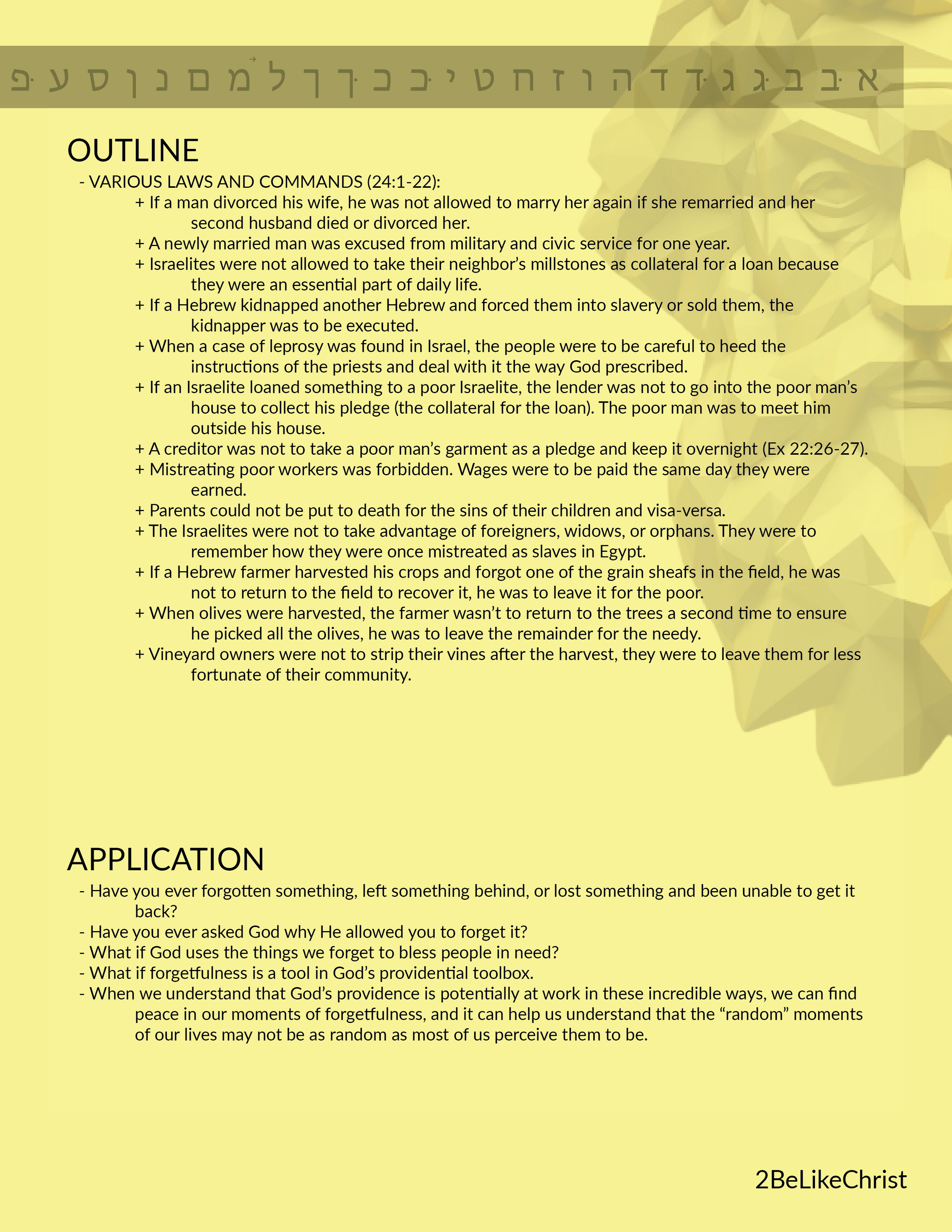Deuteronomy 24 Summary - 5 Minute Bible Study
Deuteronomy 24 Summary - A Quick Overview
WHEN:
Moses’ speech, recorded in the opening chapters of Deuteronomy, occurred immediately following the Israelites’ 40 years of wandering in the wilderness.
The Israelites were in the wilderness from approximately 1490-1450 B.C.
The Book of Deuteronomy opens on the 1st day of the 11th month in the 40th year (Deu 1:3) following the Israelites departure from Egypt (approximately 1450 B.C.).
CHARACTERS:
Israelites (Hebrews) – The descendants of Abraham, Isaac, and Jacob. God granted them freedom after several hundred years in slavery in Egypt. Leading up to the book of Deuteronomy, the Israelites had spent 40 years wandering in the wilderness as they made their way to Canaan, the land God promised to give them as a home.
Moses – Moses was selected by God to lead the Israelites to Canaan. God spoke directly to Moses and Moses communicated God’s words and laws to the people.
WHERE:
Deuteronomy 1:5 tells us Moses spoke the words recorded in Deuteronomy while in Moab, probably on the plains of Moab near Pisgah (Numbers 22:1).
OUTLINE:
VARIOUS LAWS AND COMMANDS (24:1-22):
If a man divorced his wife, he was not allowed to marry her again if she remarried and her second husband died or divorced her.
A newly married man was excused from military and civic service for one year.
Israelites were not allowed to take their neighbor’s millstones as collateral for a loan because they were an essential part of daily life.
If a Hebrew kidnapped another Hebrew and forced them into slavery or sold them, the kidnapper was to be executed.
When a case of leprosy was found in Israel, the people were to be careful to heed the instructions of the priests and deal with it the way God prescribed.
If an Israelite loaned something to another Israelite, the lender was not to go into the poor man’s house to collect his pledge (the collateral for the loan). The poor man was to meet him outside his house.
A creditor was not to take a poor man’s garment as a pledge and keep it overnight (Ex 22:26-27).
Mistreating poor workers was forbidden. Wages were to be paid the same day they were earned.
Parents could not be put to death for the sins of their children and visa-versa.
The Israelites were not to take advantage of foreigners, widows, or orphans. They were to remember how they were once mistreated as slaves in Egypt.
If a Hebrew farmer harvested his crops and forgot one of the grain sheafs in the field, he was not to return to the field to recover it, he was to leave it for the poor.
When olives were harvested, the farmer wasn’t to return to the trees a second time to ensure he picked all the olives, he was to leave the remainder for the needy.
Vineyard owners were not to strip their vines after the harvest, they were to leave them for less fortunate of their community.
APPLICATION:
Have you ever forgotten something, left something behind, or lost something and been unable to get it back?
Have you ever asked God why He allowed you to forget it?
What if God uses the things we forget to bless people in need?
What if forgetfulness is a tool in God’s providential toolbox.
When we understand that God’s providence is potentially at work in these incredible ways, we can find peace in our moments of forgetfulness, and it can help us understand that the “random” moments of our lives may not be as random as most of us perceive them to be.


